In this article:
If you are sneezing, wheezing, coughing and running a high fever, then it is quite likely that you have come down with pneumonia.
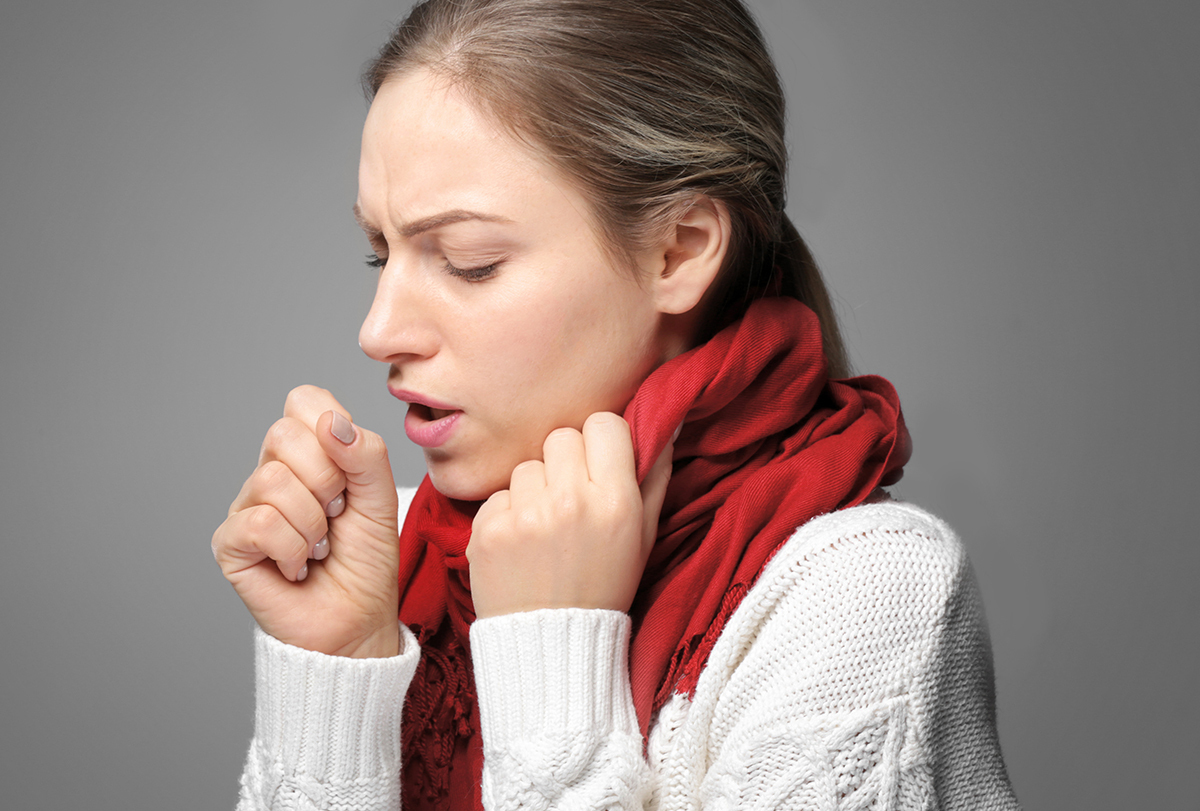
Pneumonia is a respiratory condition that is characterized by inflammation in the lungs due to bacterial, viral, or fungal infections. This infection is contagious and can be critical to the point of being life threatening at times.
Considering that pneumonia is an inflammatory disorder of the lungs which is caused due to the infection of the airways, you cannot use home remedies to treat it. Home remedies, though, when coupled with the doctor-approved treatment plan, can be quite effective in managing the symptoms of pneumonia.
Causes of Pneumonia
Often, pneumonia is a mild condition which clears up within two to three weeks. However, at times, it can become quite serious and may even prove fatal.
Pneumonia is caused by microbes or infectious agents such as bacteria, virus, and fungi. It is usually acquired from someone else or because of the infection lingering in the air.
Though your immune system is typically effective at fighting these infections, sometimes they can overcome your body’s natural defense mechanisms. (1)
Pneumonia is especially dangerous for infants, young children, adults age 65 or older, and individuals with a weakened immune system or underlying health issues. If you are already suffering from flu, cold or conditions like asthma or diabetes, then you are at a higher risk of contracting pneumonia.
Signs and Symptoms of Pneumonia
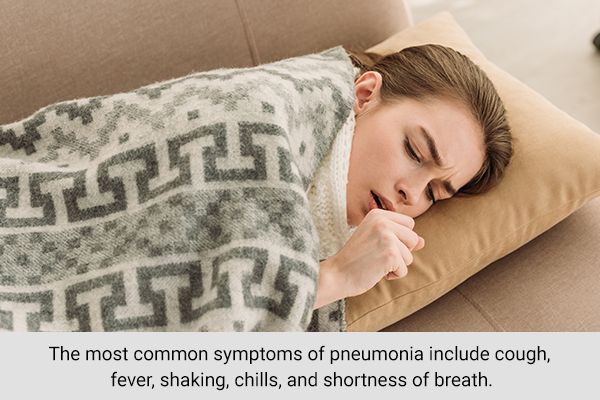
The most common symptoms of pneumonia include cough, fever, shaking, chills, and shortness of breath.
Additional symptoms that can also be present include headache, loss of appetite, fatigue, sweating, nausea and vomiting, muscle pain, and chest pain when breathing deeply or coughing. Older adults with pneumonia may experience confusion or delirium.
Below are some home remedies that you can use as complementary therapies that can be followed with your doctor’s treatment plan for easing the symptoms and for a healthier recovery.
Alternative Cures and Remedies for Pneumonia
Here are some remedies to ease the symptoms of pneumonia
1. Use garlic
Garlic has unique chemical compounds that possess the ability to fight off bacteria, viruses and fungi. (2)(3) It also helps bring down the body temperature and increases expectoration to clear phlegm out of the chest and lungs.
How to use:
- Mix 1 cup of milk in 4 cups of water and add ½ teaspoon of crushed garlic to it. Boil the solution until it is reduced to its one-fourth. Drink it 3 times a day.
- Another way to use garlic is to marinate crushed garlic cloves in a mixture of equal amounts of fresh lemon juice and honey. Take 2 to 3 teaspoons of this, 3 or 4 times a day.
- You can also rub a little garlic paste or garlic juice on your chest.
2. Drink peppermint tea
Peppermint can be used for the management of a variety of conditions. It has antibacterial, antifungal, and antiviral properties. (4) It can be used to reduce mucus production. Menthol, which is found in peppermint, can improve breathing effort. (5)(6)(7)
How to use:
- Using a tea strainer, steep peppermint leaves in 250 ml of hot water for 10–15 minutes.
- Once the mixture has cooled slightly, add 1 tablespoon of raw honey.
- Drink this peppermint tea a few times a day.
3. Sip on fenugreek tea
Fenugreek has mucolytic properties, that is, it helps break up congestion. It induces sweating which reduces fever and helps remove toxins from the body. (8)
How to use:
- Make fenugreek tea by adding 1 teaspoon of fenugreek seeds in 500 ml or about 2 cups of boiling water. Strain and drink 4 cups of fenugreek tea per day. To improve its taste, you can add a little lemon juice. Reduce the amount you drink as your symptoms improve.
- Prepare an herbal tea by steeping 1 teaspoon of fenugreek seeds, 1 teaspoon of ginger, 1 crushed garlic clove, and a pinch of cayenne pepper in 1 cup of hot water for about 5 minutes. Strain it and squeeze the juice from ½ lemon into it. You can also add a little honey. Drink this tea a few times throughout the day.
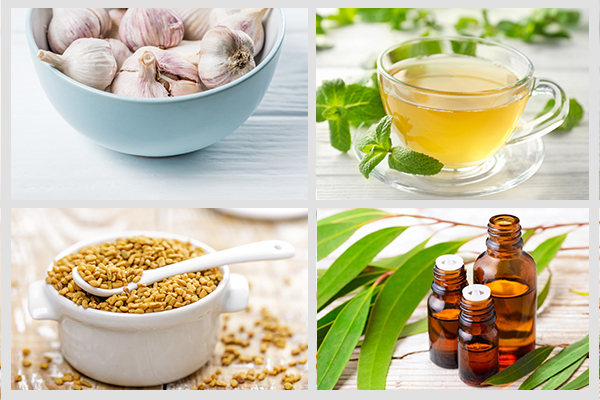
4. Apply eucalyptus oil
Eucalyptus oil helps to reduce mucus production in the respiratory tract and alleviates cough. In addition, it has antimicrobial and anti-inflammatory properties that can combat infection. (9)
How to use:
- Apply 2 to 3 drops of eucalyptus oil to the chest or back
- You can also add a few drops of the oil to your diffuser.
5. Use turmeric
Like fenugreek, turmeric (curcumin) works as a mucolytic to expel mucus from the body, particularly from the respiratory tract. Plus, it has antiviral and antibacterial properties that assist in fighting infection. (10)
How to use:
- Mix turmeric powder in warm mustard oil to make a paste. Rub it on your chest.
- Drink a glass of warm milk mixed with 1 teaspoon of turmeric powder, 2 or 3 times a day.
- Another option is to mix ½ teaspoon of turmeric and ¼ teaspoon of black pepper powder in a glass of warm water. Drink it once a day.
6. Holy basil and black pepper usage can provide relief
Holy basil or tulsi is an Ayurvedic herb with antimicrobial activity. (11) Black pepper (piperine) (12) is used to enhance the medicinal benefits found in turmeric. Both these ingredients are beneficial for your lungs and useful in the natural treatment of pneumonia.
How to use:
- Extract the juice from 5 basil leaves.
- Mix in a pinch of freshly ground black pepper.
- Consume it every 6 hours.
7. Dab on turpentine oil
This oil helps relieve pain and congestion associated with pneumonia. (13)
How to use:
- Rub a small amount of turpentine oil over your rib cage. You can also mix camphor in it and then massage.
- Cover the area with a warm cotton or wool cloth.
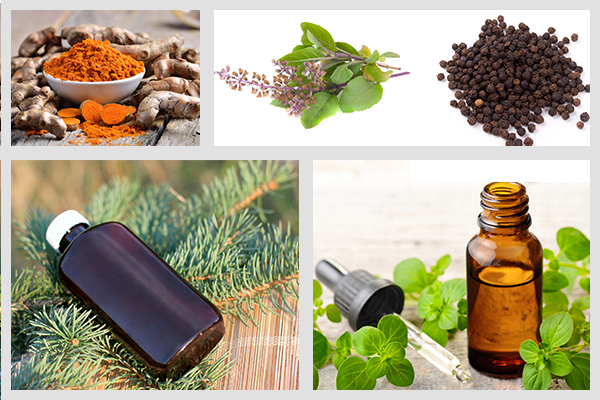
8. Try using oil of oregano
Oil of oregano (Origanum) combats pneumonia-causing germs due to its antiviral, antibacterial and antifungal properties. It also helps to thin mucus and clear congestion. (14)
How to use:
- Add 2 or 3 drops of oregano oil to a glass of water or fresh juice. Drink it 3 times daily.
- Put 1 or 2 drops of this essential oil on a tissue or cotton ball and place it beside your pillow before going to sleep so you can inhale it throughout the night.
Apart from these remedies, make sure you take the entire course of the medications prescribed by your doctor even if you start to feel better.
Not taking medication as prescribed can lead to return of pneumonia and worsen your condition. Additionally, get plenty of rest and drink lots of fluids, especially water and vegetable juices that help to boost your immunity. (15)
Consult your doctor before taking any cough or cold medicine. Coughing can actually be helpful because it helps your body get rid of mucus.
Preventing Pneumonia
You can protect yourself and those around you from getting pneumonia by incorporating the following changes in your lifestyle:
- Always cover your nose and mouth while sneezing, to prevent spreading the infection.
- Wash your hands regularly, especially before and after meals to avoid respiratory infections that at times lead to pneumonia.
- Indulge in a healthy diet and get enough sleep to keep your immune system strong.
- Regular exercise is also a contributing factor to a strong immune system.
- Get a flu shot when it becomes available; this will help reduce the risk of contracting the flu which can weaken the immune system and increase the risk of pneumonia.
- Pneumonia vaccines are effective against certain, but common, types of pneumonia; these vaccines are indicated for children under 2 years and adults 65 and older. They are also recommended for all age groups if the individual is at increased risk because of other conditions that increase the risk of contracting pneumonia or becoming too sick after contracting pneumonia.
When to See a Doctor
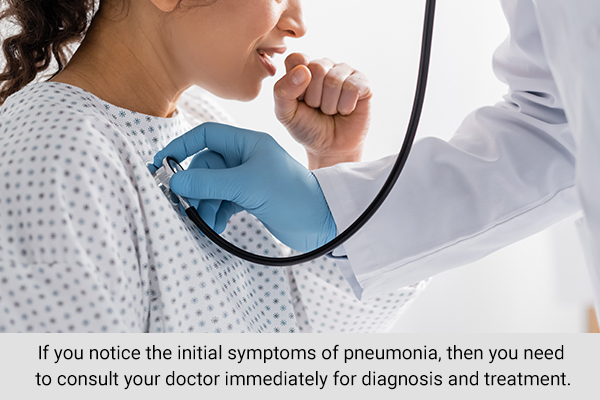
If you notice the initial symptoms of pneumonia, then you need to consult your doctor immediately for diagnosis and treatment.
Stick to the treatment plan and course of medicines prescribed by the doctor for a healthy recovery. And in case, you do not notice any improvement in your condition after 3–4 days of your treatment, then consult the doctor again.
It is important to see a doctor if you are having difficulty breathing, chest pain, persistent fever (102 degrees Fahrenheit or higher) or persistent cough.
The proper treatment for this condition depends on the type of pneumonia you have and the severity of symptoms. Severe cases may require hospitalization.
Expert Answers (Q&A)
Answered by Dr. Laren Tan, MD (Pulmonologist)
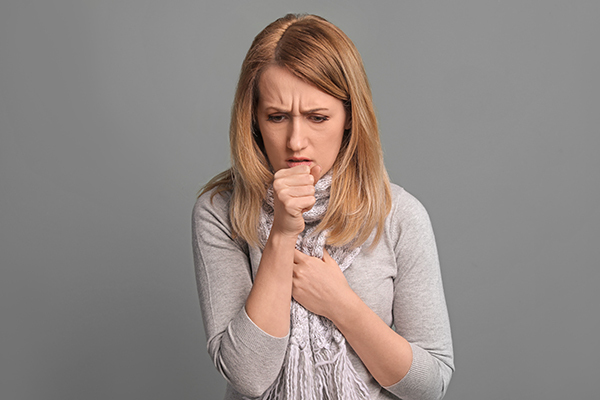
Typically symptoms improve within 72 hours, although residual symptoms like a productive cough can linger for weeks. Patients who have chronic respiratory diseases can take longer to completely recover and may be more symptomatic when compared to healthy individuals.
The majority of untreated pneumonia cases resolve on their own, whereas it becomes problematic when it continues to progress. A persistent fever, cough, chills and worsening breathlessness are typical signs, that an infection is still present, if not properly treated it could result in the body experiencing a systemic inflammatory response that could lead to being hospitalized.
The signs and symptoms between the flu and pneumonia can be similar. The Center for Disease Control and Prevention have described pneumonia as a complication of the flu that can progress to become life-threatening and even death in worst conditions.
There are instances where patients have pneumonia without high fever, that is why it is important to not base having pneumonia on just one symptom. Patients whose immune system is suppressed can react differently to infections and one of them is the body not being able to produce a high temperature.
Final Word
If pneumonia is suspected, you must consult your doctor for proper diagnosis and treatment and use home remedies only as an adjunct. This a serious infection which can take a turn for the worse if not handled properly and promptly.
Avoid breathing things that are hazardous to your lungs (i.e. tobacco smoke). Getting adequate rest and staying hydrated is extremely beneficial when recovering from a respiratory infection. If your symptoms worsen, definitely seek medical help.
For patients who have chronic respiratory diseases, it’s important that you seek medical attention sooner rather than later, especially when your symptoms have not improved.
- Was this article helpful?
- YES, THANKS!NOT REALLY



